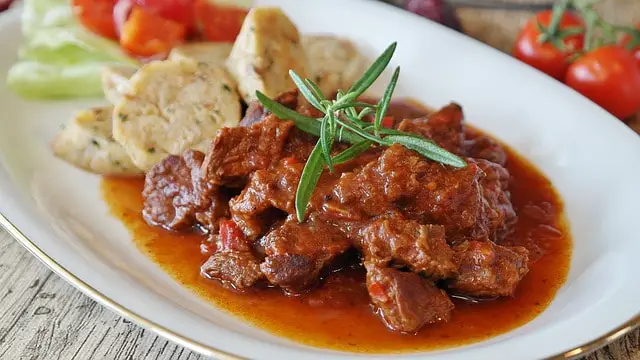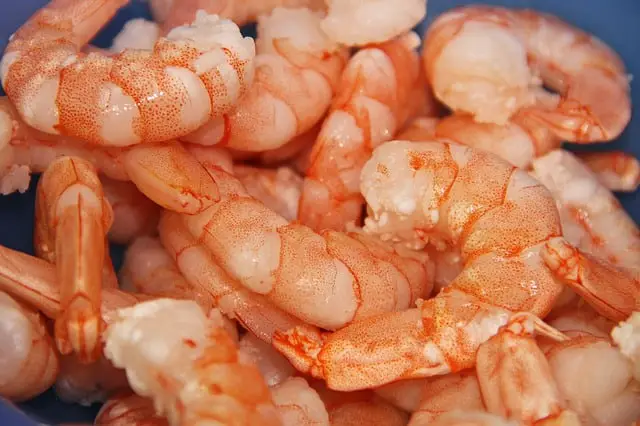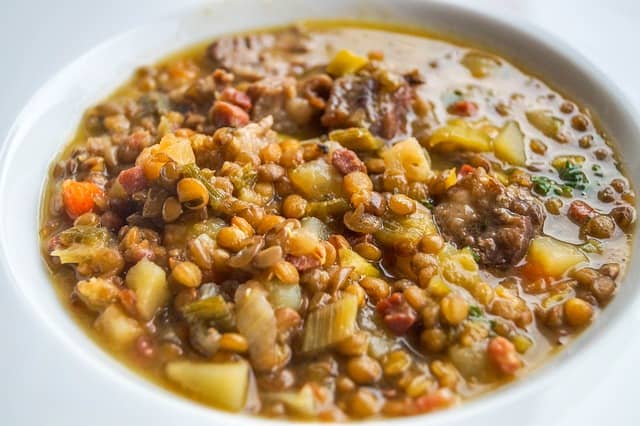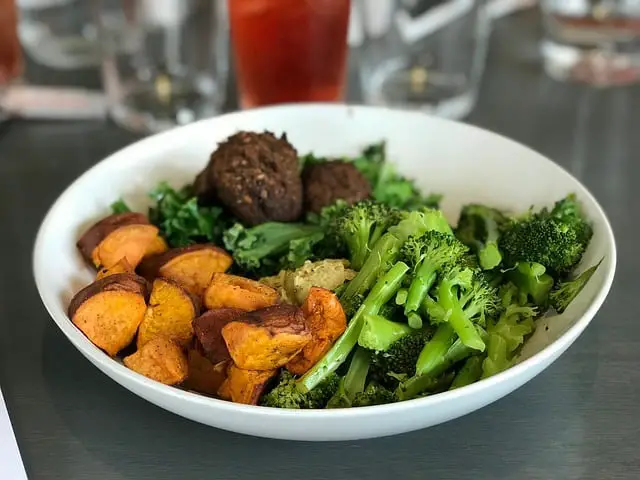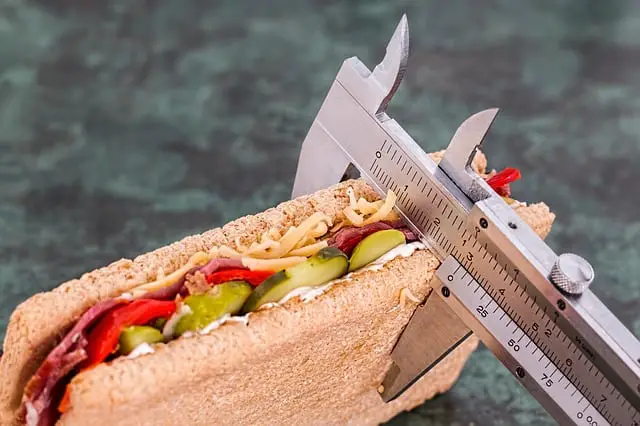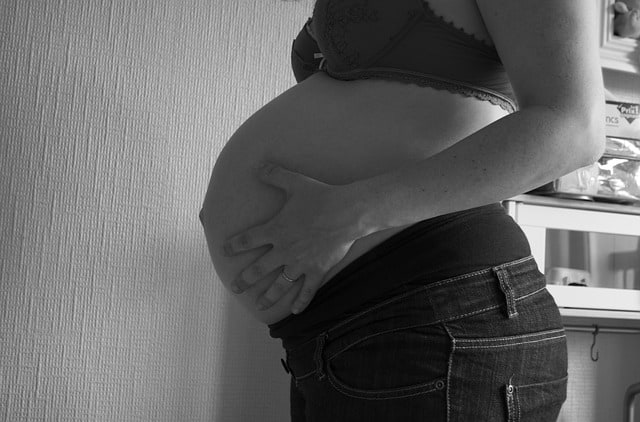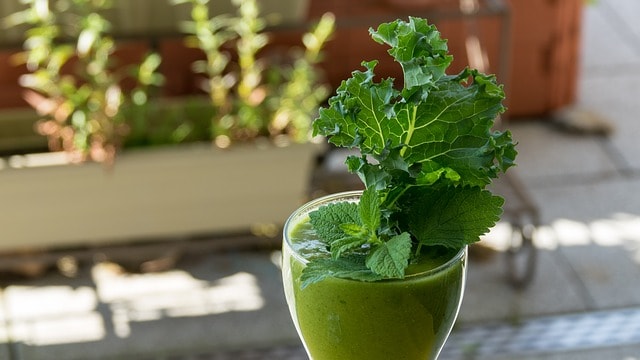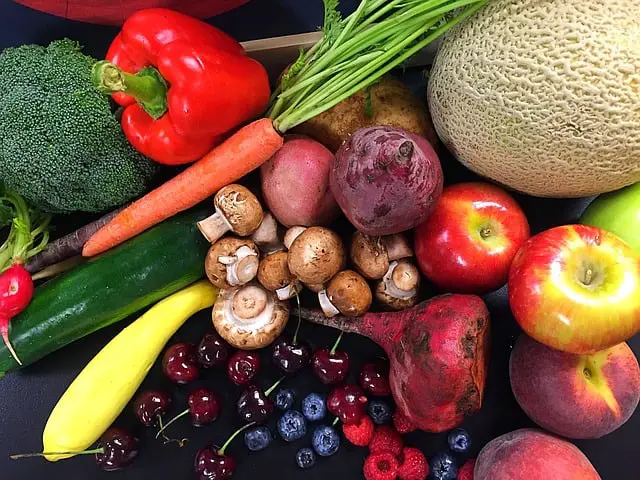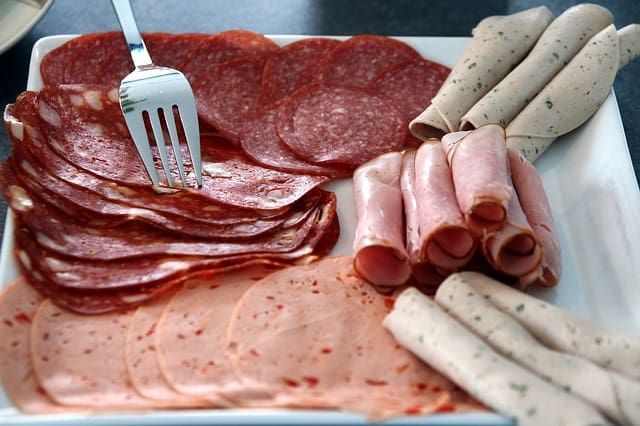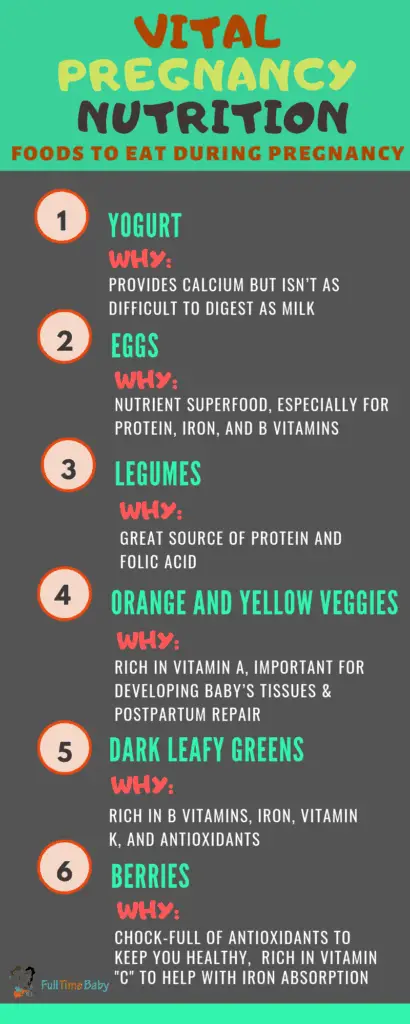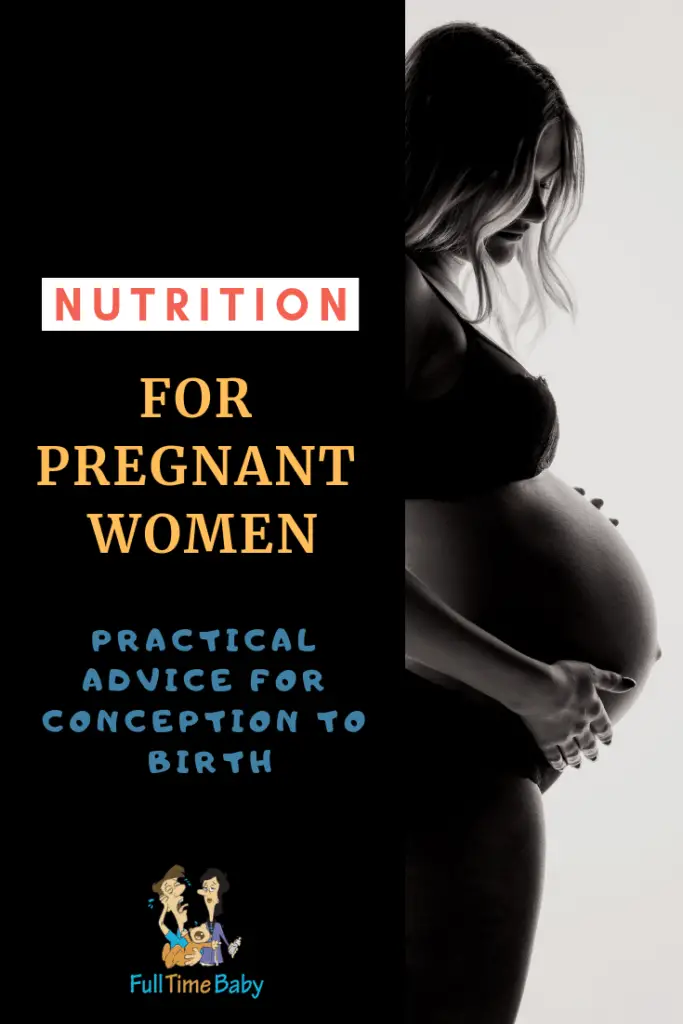If there is any time to start eating healthy, it is during pregnancy. However, making sense of pregnancy nutrition can be very confusing. Not only do you need more of certain nutrients and should avoid certain foods, but you have to do it all while battling morning sickness and food cravings.
This guide is meant to help you make sense of pregnancy nutrition so you feel confident in your food choices.
Key Nutrients that Pregnant Women Need
When a pregnant mom eats, the food goes through her digestion system and is absorbed in the gut. From there, nutrients are delivered to the growing baby through the placenta.
If the mom isn’t getting enough nutrients, the baby will “steal” nutrients from the mother. For example, if a mother isn’t eating enough calcium, the baby won’t be born with brittle bones. Rather, the baby will take calcium from the mother’s bones – potentially causing osteoporosis for the mom later in life! (1)
Thus, it is very important – for both baby and mom — to meet nutritional needs during pregnancy.
Below are the key nutrients that pregnant women should focus on getting.
Protein
Protein is required for the growth of the baby’s tissues. It isn’t just muscle tissue either. Protein is needed to grow brain tissue, connective tissue, and much more. Protein also has roles like improving blood supply.
The amount of protein you need during pregnancy depends on your weight. It is generally recommended that pregnant women consume 0.88 to 1.1 grams of protein per kilogram of body weight. For a 150lb women (68kg), that translates into 60 to 75 grams of protein per day.
Some studies have found that pregnant women may need as much as 1.52 grams/kg daily, or roughly 79g of protein per day during early pregnancy and 108g per day during later pregnancy. (2)
Amino Acids
Amino acids are the building blocks of proteins. There are 20 different essential amino acids (meaning that our bodies can’t make them and we need to get them from food).
Each amino acid performs a different role in the body. To ensure you are getting all the amino acids you need, be sure to eat protein from a variety of sources.
Good sources of protein for pregnant women include:
- Lean meat
- Fish
- Nuts and seeds
- Beans and legumes
- Cheese
- Tofu
- Eggs
*Many pregnant women develop an aversion to meat during pregnancy. If this is the case or you are a vegetarian, make sure you are getting enough protein from other sources!
Iron
The body uses iron to make hemoglobin, a component of red blood cells. You need RBCs to help deliver oxygen to the growing baby. Iron is incredibly important for pregnant women, especially since your blood volume will increase by nearly 50% in late pregnancy! (3)
Without enough iron, pregnant women can feel fatigued. They may develop anemia and could have a preterm birth or a baby with low birth weight.
Make sure you are eating iron-rich foods during pregnancy such as:
- Whole grains
- Leafy greens
- Red meat
- Beans and lentils
- Fortified cereals
- Pumpkin seeds
Tip: Vitamin C helps the body absorb iron. If your blood tests show that your iron levels are low, make sure to consume some vitamin C foods (such as lemon or orange juice) along with your iron foods. (4)
Omega 3 Fatty Acids
Omega 3 has gotten a lot of attention recently for all of the health benefits it provides, particularly in fighting inflammation. During pregnancy, omega 3 is very important because of its role in developing the baby’s nervous system – including the brain.
Research shows numerous benefits of consuming Omega 3 fatty acids during pregnancy, including:
- Preventing postpartum depression
- Reduced risk of preterm birth
- Increased immunity during pregnancy
- Improved scores on memory and verbal intelligence tests
This last benefit is particularly interesting. If you want a smarter child, it is worth making sure you get enough Omega 3 fatty acids.
DHA
You need to know that the body also converts Omega 3 into other fatty acids. One of these is docosahexaenoic acid (DHA). DHA has separate roles from Omega 3. It is particularly important for brain and retina development, for example.
However, the body is very inefficient at converting Omega 3 into DHA. Thus, it is important to get DHA from food sources as well.
Sources of DHA include:
- Microalgae
- Fish oils
- Krill oil
- Fatty fish such as salmon, tuna, mackerel, sardines, and anchovies
The general consensus is that pregnant women need at least 200mg of DHA per day. You can get this much by eating seafood 1-2 times per week. (5) Because seafood might have high levels of mercury, the American Pregnancy Association says the safest source of DHA during pregnancy is fish oil supplements. (6, 7 ,8)
Vitamin D
You probably know that the body needs vitamin D to absorb calcium. But vitamin D also has many other roles, such as regulating cell growth, immune function, and inflammation.
The recommended amount of Vitamin D is the same for pregnant and non-pregnant women (600IU). However, vitamin D is worth talking about because many people are deficient in vitamin D.
Important notes about vitamin D:
- Vitamin D from Sunlight: Our bodies can make vitamin D from sunlight – but it must be direct sunlight. You won’t get vitamin D from sunlight through a window! Wearing sunscreen can also hinder the body’s ability to make vitamin D.
- Fat Soluble: Vitamin D is fat-soluble. That means it requires fat to get absorbed into the body. If you aren’t consuming enough fat, vitamin D won’t be absorbed into your body.
- Overweight People: Since vitamin D is fat soluble, it can end up being stored in fatty tissues of overweight people. As a result, overweight people might be more prone to deficiency – even if they are getting adequate sunlight.
Food Sources of Vitamin D:
Unfortunately, very few foods naturally contain vitamin D. Fatty fish are one of these sources (such as salmon, mackerel, and tuna). Fish liver oils and certain wild mushrooms such as chanterelle also contain vitamin D. Dairy products are often fortified with vitamin D.
If you are concerned about vitamin D levels during pregnancy, it is worth getting a blood test to see if you are deficient or not. (9 ,10)
Calcium
The calcium is needed to help grow your baby’s bones and teeth. It is also important for functions like nerve transmission and muscle contractions.
Adult women generally need about 1000mg of calcium per day. During pregnancy, as much as 250mg of calcium is transferred to the growing baby. However, because pregnant women absorb and use calcium better, the calcium RDA for pregnant women doesn’t increase.
Even though the RDA stays the same, it is important to make sure you are getting enough calcium during pregnancy. Low calcium levels have been associated with high blood pressure and preeclampsia – conditions common during pregnancy. (11)
Good sources of calcium during pregnancy include:
- Milk
- Fortified plant “milks”
- Yogurt
- Cheese
- Certain leafy greens, such as kale and Swiss chard
- Nuts such as almonds
Folic Acid and Other B Vitamins
There are 8 different B vitamins. These vitamins perform a wide range of roles in the body. Most notably, B vitamins during pregnancy:
- Are integral for the baby’s brain and nervous system development
- Converting food into energy
Vitamin B9 (also known as folate in its synthetic form) is so important that your health provider probably told you to take it in a prenatal vitamin. The CDC recommends:
“All women of childbearing age consume 0.4 mg (400 micrograms) of folic acid daily to prevent two common and serious birth defects, spina bifida and anencephaly.”
It’s not enough to just take folate as a supplement. You should also get it from natural sources to make a total of at least 600mg of folate daily.
Natural sources of folate include:
- Dark leafy greens
- Nuts
- Eggs
- Legumes (such as lentils and beans)
- Liver
- Citrus fruits
In addition, you’ll need to make sure you are getting enough of the other B vitamins. B12, for example, is particularly important for making DNA. During pregnancy you need 2.6 micrograms of B12 daily.
B12 is only found in animal products, so vegans will need to take a supplement. Natural sources include meat, liver, fish, and milk. (12, 13, 14, 15)
Vitamin A
Vitamin A is an important pregnancy nutrient which often gets overlooked. Your growing baby needs vitamin A for development of the heart, lungs, kidneys, bones, and other organs and systems.
Mom also needs vitamin A to help with postpartum tissue repair, as well as aiding immunity during pregnancy.
However, there is a lot of controversy around vitamin A in pregnancy. Some people claim that vitamin A is toxic during pregnancy, and should be avoided. Others claim that pregnant women need to make sure they get enough vitamin A. Who is right?
Two Types of Vitamin A
There are two types of vitamin A you can get.
- Preformed vitamin A: This is found in animal products, especially liver and other organ meat.
- Provitamin A carotenoids: Your body is able to make vitamin A out of these carotenoids (such as beta carotene).
Eating too much preformed vitamin A can cause birth defects. Women (pregnant or not) should not consume more than 3,000mcg of preformed vitamin A daily. However, you can eat as much provitamin A carotenoids as you want. They will NOT cause birth defects.
Good sources of provitamin A carotenoids include:
- Carrots
- Sweet potatoes
- Leafy green vegetables
- Red peppers
- Yellow fruits, such as apricots and mango
Calories during Pregnancy
Most women now realize that the old adage “eating for two” isn’t true: you do NOT need to double your calories during pregnancy. However, trying to make sense of calories during pregnancy is very confusing.
There are conflicting suggestions on how many calories you need during pregnancy. The guidelines on pregnancy weight gain can also be very difficult to follow when you feel like you have no control over your appetite.
First Trimester Calories:
Virtually all experts agree that you do not need any extra calories during the first trimester of pregnancy. This doesn’t mean that you won’t end up eating extra calories though.
While some women can’t eat at all during early pregnancy due to morning sickness (or, worse, hyperemesis gravidarum), other women find that the only way to keep sickness at bay is to constantly eat.
On average, women gain 1-5lbs during the first trimester of pregnancy. However, this is an average. Some women lose weight due to morning sickness. Others will gain more.
If you’ve gained more than 5lbs during the first trimester, you probably don’t need to worry. Many women who gain weight during the first trimester slow down weight gain later in pregnancy. (19)
Tips for First Trimester Calorie Intake:
- Take your prenatal vitamin
- If you have severe morning sickness, try drinking cold smoothies with superfoods in them. They are easier to digest and less painful to vomit up!
- Try eating more protein to alleviate morning sickness.
- If you are constantly hungry, focus on eating nutritious superfoods instead of junk foods. Eat fiber and protein with each meal to help you feel full longer.
Second Trimester Calories:
Here is where pregnancy calorie counts gets confusing. For singleton pregnancies, there are these varying recommendations:
- What to Expect recommends getting 300-350 extra calories per day.
- The ACOG recommendations are 340 extra calories per day.
- The newly-updated recommendations from the National Institute for Health and Care Excellence (NICE) recommend NO extra calories during the second trimester.
The discrepancies have to do with the fact that many women start their pregnancies overweight. Nearly half of expectant mothers are overweight or obese! (20)
Further, most women are not getting enough exercise during pregnancy. (21)
Eating too much and not exercising is causing women to gain too much weight during pregnancy. Too much weight gain can then cause problems such as gestational diabetes, high blood pressure, and cesarean birth.
So, how many calories should you be consuming during the second trimester? Like with everything pregnancy-related, this varies depending on the mother.
Tips for Second Trimester Calorie Intake:
- Exercise: Since the first-trimester morning sickness has (hopefully) worn off, now is a good time to start exercising. Unless your doctor says otherwise, at least 30 minutes of moderate-intensity exercise is recommended. If you have not exercised before pregnancy, you should begin with a maximum of three 15-minute exercise sessions and build up to 30-minute sessions. (22)
- Keep healthy snacks with you at all times: This way you will have healthy foods to eat if hunger strikes while you are out and won’t have to turn to junky convenience foods.
- Eat a balanced diet: Aim to get at least 7 servings of fruits and veggies, 4 servings of dairy, 2 servings of protein, and 9 servings of whole grains each day. (23)
- Focus on food groups, not calories: Counting calories is not practical for most women. Instead, focus on getting enough of each of the food groups.
- Get your fatty acids: Make sure you get enough omega 3 fatty acids by eating non-mercury fish 1-2 times per week or taking a supplement.
Third Trimester Calories:
The third trimester is when the baby starts to develop rapidly. On average, a fetus will weight around 2lbs at 27 weeks, 4-4.5lbs at 32 weeks, and 6.75lbs to 10lbs by birth. (24)
With so much growth happening, you can absolutely expect to gain weight during the third trimester. You’ll need to increase your calorie intake to keep up. This doesn’t mean you can eat whatever you want though.
Depending on how you entered pregnancy, how much weight you gained during the 1st and 2nd trimesters, and whether you keep up with exercise, you’ll need 200-500 extra calories per day. (25, 26, 27)
Tips for Third Trimester Calorie Intake:
- Eat frequently: The growing baby will be pressing on your stomach, making it uncomfortable to eat. Eating smaller meals more frequently will help you get enough calories during the day.
- Focus on protein: Approximately 20% of your calories should come from protein. You’ll need about 70 grams of protein per day during the last trimester. (28)
- Supplement with fatty acids: It can be hard to get enough essential fatty acids during the third trimester, so discuss with your doctor whether you should be supplementing. (29)
- Adjust your exercises: Exercise is still important during the third trimester, but may be harder because of all the extra baby weight. Consider joining an exercise class designed for pregnant women.
Overweight and Pregnant
If you are overweight and pregnant, the news isn’t good. Being overweight during pregnancy increases the risk of complications such as:
- High blood pressure and preeclampsia
- Gestational diabetes
- Increased risk of miscarriage
- Blood clots
- Post-partum hemorrhage
- Sleep apnea
- Having a large baby (which can cause the baby to get “stuck” or require a C-section birth).
*Overweight is defined as having a Body Mass Index (BMI) of 25 or more. You can learn more about BMI and see where you stand with this BMI calculator.
Should You Try to Lose Weight during Pregnancy?
Ideally, you should lose weight before you become pregnant. Once you are pregnant though, you should NOT try to lose weight.
The evidence shows that the risks don’t go away if an overweight women loses the weight during pregnancy. Losing weight during pregnancy could actually increase some risks – such as having a premature birth or a very small baby.
How Much Weight Should I Gain if Overweight When Pregnant?
The guidelines recommend gaining about 15-25lbs if you are overweight during pregnancy. Or, if you are obese during pregnancy, you should gain around 11-20lbs.
Bear in mind that these are only guidelines. It is very important that you discuss with your doctor what an appropriate amount of weight gain during pregnancy is for your specific needs. Getting too fixated on the numbers could cause you to gain too little weight and have adverse effects for your baby.
Tips for a Healthy Overweight Pregnancy
- Start Exercising: Yes, even overweight women are advised to exercise during pregnancy! Start with activities such as walking three times a week for 15 minutes. Build up to 30-minute sessions.
- Avoid simple starches (such as white bread and potatoes) and refined sugars: These types of sugars because will cause your blood sugar to spike. Since overweight pregnant women are already at an increased risk of gestation diabetes, it is important to avoid them.
- Test for gestational diabetes early: Because of the increased risk, you may need to test at your first prenatal visit as well as the recommended 24-28 weeks.
- Avoid juices: Even natural juices contain a lot of sugars and calories. Drink water or milk instead.
- Don’t stress about calories: If you are eating a variety of healthy foods, you shouldn’t have to worry about calorie counts. Just avoid processed junk foods at all costs in favor of natural foods like fruits, veggies, and lean meat.
- You still need fat: Pregnancy is not the time to go on a low-fat diet! Your growing baby needs essential fatty acids. You also need fat to absorb fat-soluble vitamins like vitamin D. Eat healthy fats like avocados, nuts, seeds, and low-mercury fish.
- Remember that you aren’t alone! Nearly half of women are overweight when they enter pregnancy. Don’t get caught up in the body-shaming or overwhelmed by the possible risks of an overweight pregnancy. Instead, network with other plus-sized moms to get support you need to eat right.
Pregnancy Weight Gain Recommendations
I’m reluctant to republish these pregnancy weight gain recommendations because they are just recommendations. Even healthy pregnancies can fall outside of these guidelines.
It is annoying to read “talk to your doctor” when you want advice online about what is “normal” or not. However, it is true that every pregnancy is different. You need to talk to your health care provider about what is right for you.
| Pregnancy Weight Gain Guidelines | ||
| One Baby | Twins | |
| Underweight | 28-40lbs | No guidelines available |
| Normal weight | 25-35lbs | 37-54lbs |
| Overweight | 15-25lbs | 31-50lbs |
| Obese | 11-20lbs | 25-42lbs |
(33)
What Foods to Eat During Pregnancy
There are a lot of great foods you can eat during pregnancy. We’ve made an infographic which shows some of the best foods to eat during pregnancy and why you need them.
Instead of focusing on certain foods though, you might want to follow these tips for what you eat during pregnancy.
Eat a Variety of Foods
There is no one food which will meet all of your pregnancy nutrition needs. It is important that you are choosing healthy foods from all of the major food groups. You’ll need to make sure you eat everyday:
- Whole grains
- Proteins
- Dairy or other sources of calcium
- Healthy fats
- Lots of fruits and veggies
Use the Color System for Fruits and Veggies
Most pregnancy food recommendations just say “eat 5-7 servings of fruit and vegetables per day.” This advice is inadequate. You can’t just eat 7 servings of apples and meet your nutrition needs!
Each type of fruit and veggie provides different nutrients. For example, berries are rich in antioxidants but lack minerals.
To simplify nutrition, many experts recommend “eating the rainbow.” This approach works because each “color group” usually contains certain nutrients.
- Reds: Red foods such as tomatoes and red peppers are great sources of antioxidants known as phytochemicals, such as lycopene and ellagic acid. They fight cancer and boost immunity.
- Oranges and Yellows: These foods are rich in beta carotene, which is important for eyes and immunity. They are also great sources of vitamin C. Examples include squash, mango, cantaloupe, carrots, and pineapple.
- Whites and Browns: Many of these foods – such as onions and garlic – are natural antiviral and antibacterial foods. They can also be great sources of potassium, magnesium, and vitamin C.
- Greens: These foods are high in many minerals, including calcium and iron, which are crucial during pregnancy. They are also rich in vitamins K, B, and E.
- Blues and Purples: Foods such as blueberries and eggplant contain high amounts of antioxidants which boost immunity, repair damage done by stress, and fight inflammation.
Foods to Avoid during Pregnancy
There are a lot of foods that you need to avoid during pregnancy. Before you get alarmed, know that most of these just require using common sense. However, there are a few specific concerns for pregnant women – especially fish/seafood and certain foods which may cause food poisoning.
Fish and Seafood during Pregnancy
Fish is one of the best sources of essential fatty acids – a nutrient that pregnant women need to aid in the baby’s neurological development. Because of how important fatty acids are, pregnant women are told to eat 2-3 servings (8-12oz) of fish per week. (34)
However, some types of fish are high in mercury. So, as of 2004, the FDA (and other health agencies) have advised against eating more than two 6oz servings of fish per week. (35)
What does this mean for you?
You should aim to consume the recommended two servings of fish per week, but make sure that they are low-mercury fish.
| Low-Mercury Fish/Seafood | High-Mercury Fish (Avoid) |
| Shrimp | Swordfish |
| Salmon | Shark |
| Pollock | King Mackerel |
| Catfish | Tilefish |
| Scallops | Swordfish |
| Sardines | Orange roughy |
| Tilapia | Marlin |
| Anchovies | Alfonsino |
| Shad | Pacific Bluefin tuna |
| Mullet | Norway lobster |
| Crab | Sablefish |
| Herring | |
| Rainbow trout | |
| Smelt | |
| Redfish |
Note that not all of the low-mercury fish choices are actually high in omega 3 fatty acids. If that is your goal, then you are best eating these fish/seafood below:
- Herring
- Sardines
- Anchovies
- Salmon
- Redfish
- Smelt
- Crab
What About Tuna during Pregnancy?
Tuna is generally listed as a “safe” fish to eat during pregnancy. However, some sources of tuna might contain high amounts of mercury.
Further, tuna is generally not a very good source of omega 3. Thus, it probably isn’t worth the risk of eating tuna if the goal is to get omega 3 fatty acids. (36)
Food Poisoning during Pregnancy
Pregnant women are more susceptible to food poisoning. That means they need to avoid certain foods which are risky.
Food poisoning generally doesn’t cause serious problems for pregnant women or their babies (though dehydration and exhaustion certainly aren’t fun!). However, in some cases, food poisoning can result in miscarriage or premature birth. Some types of food poisoning can travel through the placenta and infect the baby – resulting in serious complications. (37)
Risky Foods to Avoid during Pregnancy:
- Deli meat
- Raw sprouts
- Unpasteurized dairy (including blue cheeses and soft cheeses)
- Unpasteurized juices
- Raw fish
- Improperly cooked meat
(38)
Alcohol during Pregnancy
While pregnant, my mother-in-law recommended that I “drink a glass of beer” because it was full of B vitamins. She’s not the only one. It used to be common to prescribe beer to pregnant women! (39)
Nowadays, pregnant women are advised to avoid alcohol completely. If you order an alcoholic beverage while visible pregnant, you’ll probably face a lot of nasty remarks – and could even result in social services being called for child abuse! (40)
So how bad is drinking alcohol while pregnant really? It’s hard to get clear information because of all of the controversy and stigma around drinking while pregnant. There are surprisingly few studies on the topic.
One study did find that consuming 2-3 drinks per week was linked to a 10% increased risk of preterm birth. (41) Another study found that light drinking was not linked to any harm to the fetus, though having up to 4 drinks per week was linked to having a smaller baby. (42)
So, while you shouldn’t feel too guilty about having one drink at a special occasion, it is probably better to abide by “better safe than sorry.” Avoid drinking any alcohol!
Other Foods to Avoid during Pregnancy
- Processed junk food: Processed food tends to be high in unhealthy fats and sodium, but devoid in nutrients. The issue isn’t so much that junk food is bad for you (it is!), but that you won’t have room for nutrient-rich foods if you are filling yourself with junk.
- Soda and soft drinks: These are loaded with sugars and often high in caffeine. There is evidence that the sugar-free and diet sodas are even worse because they mess with your gut flora.
- White bread and other white starches: Refined starches act like sugar in the body. They will cause your blood sugar to spike then crash, leaving you feeling tired and cranky. This can set you up for gestational diabetes! They also are devoid of nutrients. (43)
- Uncooked mushrooms: Mushrooms are safe during pregnancy, but should always be cooked to kill any spores and make them easier to digest. (44, 45)
- Caffeine: The research on caffeine during pregnancy is conflicting. Some studies found adverse effects like premature birth, stillbirth, low weight, and miscarriage. Other studies have found no risk. Until more info is available, the American Pregnancy Association recommends limiting caffeine to 200mg daily (about one 12oz coffee).
- Licorice: Licorice contains an artificial sweetener called It is linked to lower IQ, ADHD, and increased levels of stress hormones. (46)
- Unripe papaya: A substance which is naturally found in unripe papaya (but not ripe papaya) could trigger uterine contractions, resulting in premature birth. (47)
| Foods to Eat during Pregnancy | ||
| Yogurt
Why: Provides much-needed calcium for your baby and isn’t as difficult to digest as milk. |
Eggs
Why: A nutrient-rich superfood, especially for protein, iron, and B vitamins. |
Legumes
Why: Great source of protein and folate. |
| Lean Meat
Why: Rich in iron, which is especially important since pregnant women are at risk of anemia. |
Berries
Why: Chock-full of antioxidants to keep you healthy, plus rich in vitamin C to help with iron absorption. |
Orange and yellow veggies
Why: Rich in beta carotene, which is important for developing baby’s tissues plus post-partum tissue repair for mom. |
| Whole Grains
Why: Provide long-lasting energy and are rich in nutrients including fiber, which can help with pregnancy constipation. |
Citrus Fruits
Why: Rich in folate plus vitamin C, which helps iron absorption. |
Nuts and Seeds
Why: A great source of protein plus healthy fatty acids that are important for your baby’s brain development. |
| Cooked Mushrooms
Why: They are rich in bioavailable iron, trace elements, antioxidants, fiber, and B vitamins. They’re also one of the only plant-based sources of vitamin D. |
High Quality Fats
Why: Fats from coconut oil, avocados, and seeds are great energy-boosters plus rich in healthy fatty acids. |
Bananas
Why: Potassium in bananas can help relieve muscle cramps that pregnant women frequently experience. |
| Salmon
Why: Is rich in omega 3 but low in mercury. |
Dark Leafy Greens
Why: These are rich in B vitamins, iron, vitamin K, and antioxidants. |
Unsweetened Cranberries
Why: Not only are they packed with vitamin C and antioxidants, but can help prevent pregnancy UTIs. |
| Foods to Eat in Moderation | ||
| Organ Meat and Fish Liver Oil
Why: While they are a great source of nutrients, consuming too much vitamin A from animal sources could cause toxicity. |
White Bread
Why: It is a simple carb which acts like sugar in the body. |
Caffeine
Why: Too much caffeine can result in low birth weight or even miscarriage. |
| Foods to Avoid | ||
| Raw Fish
Why: May contain parasitic worms, viruses, or bacteria. |
Raw Sprouts
Why: Could be contaminated with salmonella. |
Raw Mushrooms
Why: Raw mushrooms are tough on digestion and may be carcinogenic. |
| Deli Meats
Why: Potential source of listeria contamination. |
Sodas and Soft Drinks
Why: Contain caffeine and huge amounts of sugar. |
Unripe Papaya
Why: Contains a substance which may trigger uterine contractions. |
| Certain Fish
Why: Fish like marlin, swordfish shark, King Mackerel, and Tilefish are high in mercury. |
Licorice
Why: The ingredient glycyrrhizin is linked to ADHD and developmental problems. |
Unpasteurized Dairy and Juices
Why: May contain bacteria which could get you sick or even cause Toxoplasmosis. |
| Processed Junk Food
Why: Contains very few nutrients but loaded with sugars, sodium, and unhealthy fats. |
Alcohol
Why: May result in fetal alcohol syndrome and physical and mental problems for your baby. |
Sweets
Why: Can cause blood sugar hikes and gestational diabetes. |



